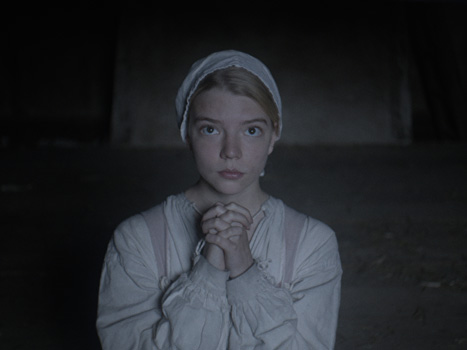Who answers your prayers?
Directed and Written by: Robert Eggers
Cast: Anya Taylor-Joy, Ralph Ineson, Kate Dickie, Harvey Scrimshaw
Swift shot: After fleeing England for the New World, a 17th century New England farmer and his family are banished from their Puritan town. They are forced to live in the wild, near a forest which breathes agony. As they confront the evil seeping in, their faith is shattered at every fade to black. Robert Eggers creates a pulse of images and sound, while drawing heavily from his classic horror film influences as he meticulously constructs a dark dawn.
The Witch focuses on the plight of Thomasin (Taylor-Joy) a young girl who is becoming a woman in a puritanical family. Things are not easy, but they become wretched for her when her baby brother, Samuel vanishes under her care just on the edge of the woods. Her family is immediately suspicious about what happened to Samuel, as there is no trace of him anywhere. They assume it was a wolf, but Thomasin insists she didn’t see a wolf.
But, we, the audience are immediately aware of the existence of the hag that snatched up Samuel who does ungodly, awful, terrible things to the innocent baby. It’s the definition of appalling, truthfully.
Thomasin is distraught, and her mother Katherine (Dickie) is a nervous wreck, confined to her bed chambers. Katherine prays endlessly for forgiveness and to have Samuel be returned to her. She wonders if her husband’s pride is why God has taken her baby boy. She wonders if she is being tested for a reason, as she fled England to solidify her faith, and now they find themselves in a horror.
Her husband, William (Ineson) desperately searches the dark forest with his oldest son, Caleb (Scrimshaw). Caleb is terrified at the prospect of Samuel going to hell, because he never committed any sin, how could someone so innocent suffer damnation. It’s grand turmoil like this throughout The Witch that make it more than just another horror film. As a father struggles to come to terms with what happened to his baby boy, his other children seek guidance . . . but he has no real answers, save their faith.
William tries to focus on the hearth, but there isn’t any good crop, the soil is rotten, something is wrong. They are nearing starvation, and they have been banished from any help that might be found.
To make matters worse, they all have to endure the twins, Thomasin’s youngest siblings, Mercy (Ellie Grainger) and Jonas (Lucas Dawson) who perpetually go around singing horrible nursery rhymes that Eggers conjured up using as much 17th century source material as possible. And, The Witch reminded me that most nursery rhymes of the time were designed to scare the living shit out of kids . . . to keep them from wandering off and playing in the forest. I had a hard time understanding the kids through their authentic Yorkshire accents, but I wouldn’t change a thing with their exceptional performances.
In fact, the acting throughout The Witch was powerful and memorable, with a stand out showing by Harvey Scrimshaw, who I swear to God has to be the best actor in his age group. If he sticks to acting, just be prepared to see him at The Oscars. And Anya Taylor-Joy conveys more than her dialog would allow with deeply expressive eyes, she will make you care about her plight.
What makes The Witch worthy of recognition is the subtlety in how the attacks on the family are handled throughout. We are aware that a witch is in the woods and is bringing mischief and murder on this sad family, while they implode. We want them to focus on the true evil at hand, but they ultimately collapse, their faith crumbles and we are left pondering many questions.
I heard that this movie scared the hell out of Stephen King, for my part I can only tell you it didn’t terrify me, but it did make my skin crawl. And it did linger long after I left the theater. While The Witch didn’t frighten me on the spectrum I was hoping for, it did pose tough questions about faith and morality. In the end, I like being challenged about the deep, darker questions that make up our souls and define who we are.




